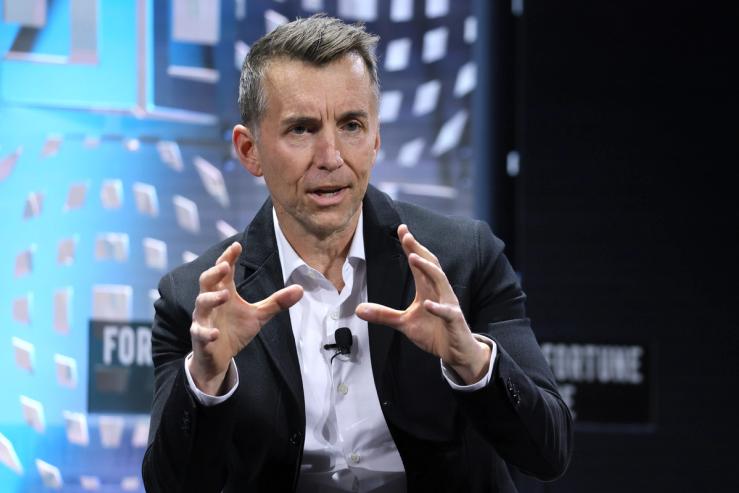The Signal Insight
Can AI make your business more human? Zig Serafin’s contention is that it can, and it needs to. Since 2020, the former Microsoft executive has been CEO of Qualtrics, a company specializing in “experience management,” or the challenge of helping businesses collect, analyze, and respond to data on their interactions with customers.
Qualtrics, whose clients include the likes of Ford, ServiceNow, and Walmart, has evolved from a survey tool for academic research into a software business that is increasingly powered by AI tools. Since Serafin joined in 2016, it has undergone a series of ownership changes: The German enterprise software group SAP bought Qualtrics for $8 billion as it was preparing to go public in 2018. Serafin oversaw its IPO in 2021, and two years later, a group led by Silver Lake took the company private again at a valuation of $12.5 billion.
Serafin pitches Qualtrics as using technology to solve a problem technology created, saying companies now struggle to piece together a coherent picture of their customers across their call centers, apps, websites, text messages, and social media accounts. Its 16 billion customer profiles amount to “a massive sentiment database,” he says, which is yielding increasingly valuable insights as AI advances.
Qualtrics has begun rolling out autonomous “experience agents” to help clients intervene sooner when something goes wrong for one of their customers. “The important departure here is our focus on helping companies build deeper trust using AI, by building a closer human connection, not just efficiency and optimization,” Serafin says. He adds that his own use of AI tools has been critical for showing his employees what the technology can do for the business.
This interview has been condensed and edited for clarity.
Andrew Edgecliffe-Johnson: Surveys on consumers’ interactions with companies still show they’re frustrated, despite investments in customer service technology. What’s the scale of the problem you’re trying to help companies solve?
Zig Serafin: Technology has exploded the number of different channels that a human being can use to interact with a business. That has created a lot more entropy and complexity because the technology for all of these channels was implemented in silos. Every department could say, “Hey, I think I’m doing a great job.” But the CEO looks at her business across the sum of all the parts, and it becomes very difficult to actually know how the customer is doing. People came along and said, “I can tell you if someone was happy or not as a result of calling your call center.” Turns out that was wrong, because the reality is they were happy, perhaps, with the customer service agent. But that doesn’t mean that they were happy about the reason why they had to pick up the phone in the first place.
What are you doing to develop an AI mindset in the company?
First off, I would say, never underestimate the importance of what my own habits are and how they come across. There’s probably not a half an hour in the day where I’m not using AI in some way or another to expand my capability. I have my own AI workforce that works for me now, including our own tools and third-party tools like Gemini and ChatGPT.
You’ve got to live the example on this and be willing to experiment yourself. What I have found is the pace at which I can produce an idea or get something done is easily improving by about 20% or 30%. We’ve set out to reframe the company to be a pure AI-based company. That won’t happen overnight. It’s not a deterministic path. Frankly, it’s a path that should be fraught with error and learning. How budgets are allocated will also become a forcing function for people saying, “OK, I didn’t know I could go do these things in this type of timing.”
What’s your perspective on the debate on whether we’re about to see a vast reduction in the number of people working in customer service roles?
We do expect there will be a very substantial opportunity to improve efficiency. That will mean very predictable and repetitive tasks that it now takes humans now to do will be replaced by agents. [But] you’ll have experience agents [that] come in and make sure that we don’t just [create] a more efficient working environment, but we also make sure that the way we show up with the experience of that customer is also done with empathy.
What happens to all the people that might get displaced? In every major inflection point of innovation, it allows human beings to spend more time on things that deepen the connection with other human beings, and that usually means that you exercise the things that make us more human, [like] creativity, judgment, empathy, and care.
What have you found is most important in getting a message down from the corner office to your employees?
Repetition is important, and clarity, and simplicity. I don’t think things are ever clear enough. How do you keep getting clearer and clearer and clearer? It’s an iteration, and that’s because the picture in front of you gets clearer too as you make progress. It’s important also to have shared purpose. If there’s something that you’re working towards that’s not relatable to people, it won’t bring out the heart. Maybe it brings out the brain, but frankly, the moments that create the greatest inflection point of brilliance and the greatest human energies are when you can bring out the best of people, because you connected with the heart on something that you’re working on. So if a vision or a direction isn’t relatable, then talk all you want about the objective you want to achieve; it won’t get people up in the mornings.
What shaped you as a leader?
One of my first jobs was working for a very small manufacturing business. And when the day was done, you picked up everything that was on that shop floor. You made sure that everything was set up to be cleaned and properly ready to go the next day. And you made sure that any customer that you interacted with was happy and that everything was left correctly. And you made sure that you paid attention to every single cost. I’ve never seen the world any differently. I think that keeping a small business mindset keeps you grounded, and creates an ownership mentality. It’s what I expect of the people that I get to work with. It’s what motivates people to want to be a part of the organization as well.
Notable
- Qualtrics’ president of product, Brad Anderson, sat down with Business Insider to discuss his company’s vision for agentic AI.


